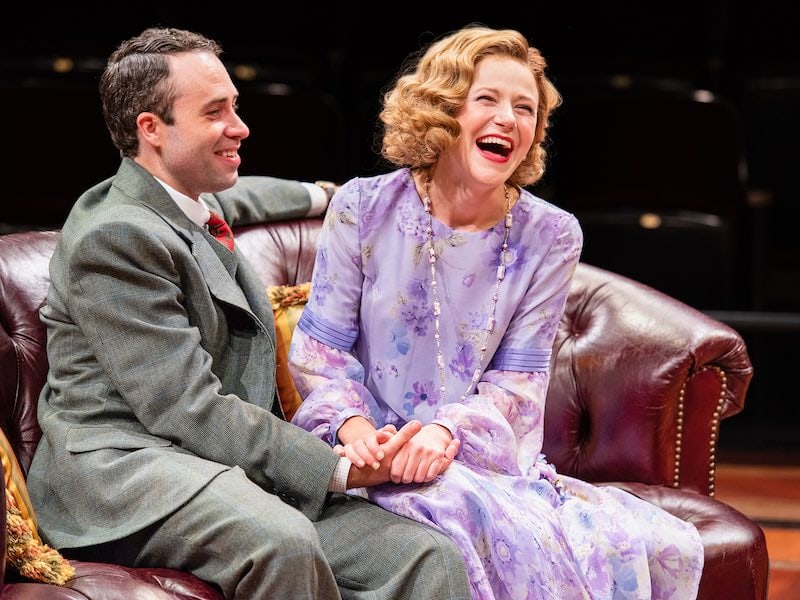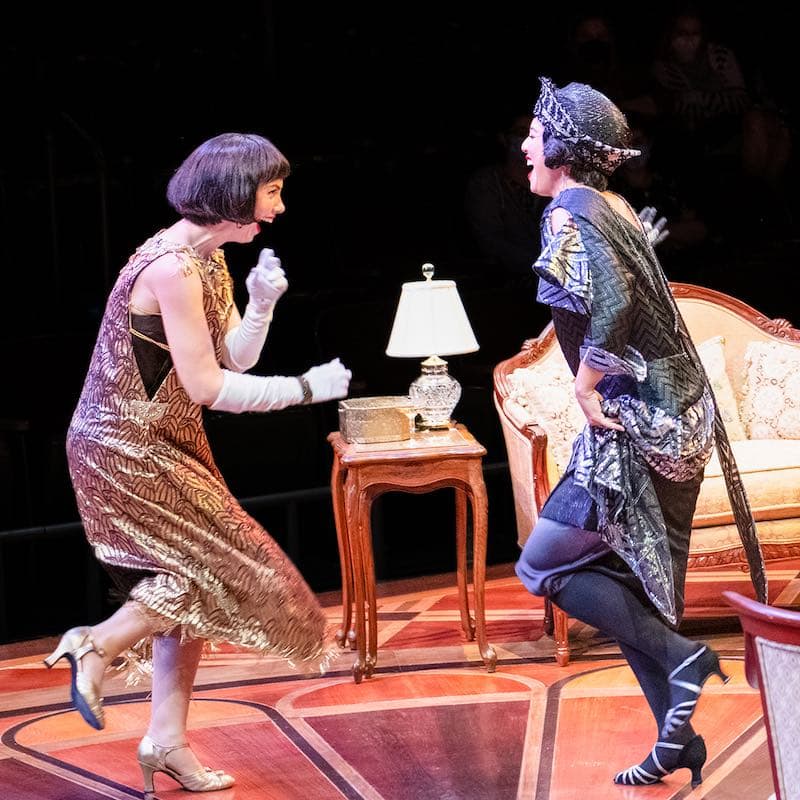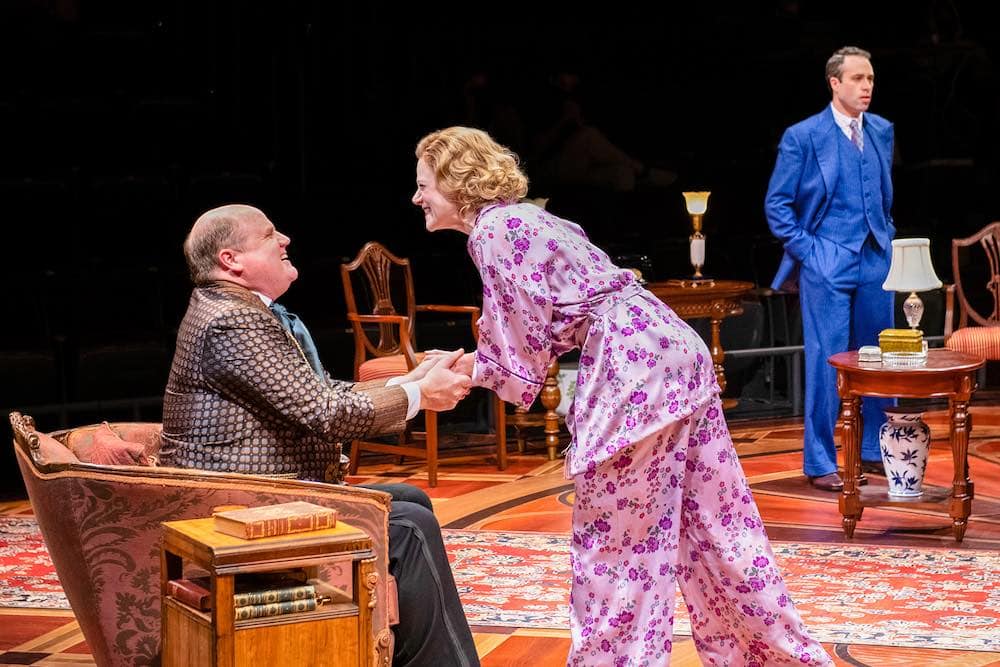“There is no wealth but life. Life, including all its powers of love, of joy, and of admiration. That country is the richest which nourishes the greatest number of noble and happy human beings.”
That’s not a line by the early 20th-century American playwright Philip Barry but by the late 19th-century British writer and polymath John Ruskin. The ethos, though, runs through Barry’s Holiday, now in a pleasant but not always even revival at Arena Stage.
Directed by Anita Maynard-Losh, Arena’s long-serving director of community engagement and senior artistic advisor, the production delivers on Barry’s sparkling dialogue, from the snide to the sentimental, as well as a genuinely winning love story between two “queer ducks,” but stumbles through its potentially radical thesis on the nature of money and happiness.

Between the two World Wars, no American playwright had more successes, and more failures, than Philip Barry. Before his death at 53 in 1949, 21 of his 23 plays made it to Broadway. Some lasted a year, others a week. His most successful plays at the box office—Paris Bound, Holiday, and The Philadelphia Story—belong to a small list of plays he elegantly and wittily dashed off concerning the nature of true love and marriage, as well as struggles against convention.
Born the youngest child of a successful Irish Catholic businessman in Rochester, Barry ascended the social ladder as a young man. Often spoken of in the same breath as Wharton and Fitzgerald, fellow satirist and critics of America’s beau monde, Barry took a gentler view of the “haves,” the kind that comes from being born an outsider but made an insider, from the mixture of aspirations and aspersions.
Aspirations and aspersions abound in Holiday. At its heart, the play considers whether Johnny Case (Sean Wiberg), a young man who has risen from humble beginnings to the brink of fortune, is a “comer” or an “idler.” Since the age of ten, he has nurtured a single idea: earn a nice round $20,000 and retire for as long as it lasts, to till the garden of his soul. A second Thoreau, a proto-Kerouac. Unfortunately, he’s fallen for Julia Seton (Olivia Hebert), daughter of the great financial kingpin Edward Seton (Todd Scofield), ensconced in a five-floor Fifth Avenue mansion.
Misha Kachman’s set fills the Fichandler stage with a small department store’s worth of chairs and sofas in deep reds and golds, a decadently upholstered prison of sorts. Maynard-Losh keeps the action going through strong and balanced movement. Each of the play’s three acts earns its time on the stage.

Over the play, Johnny’s proposition is poked and prodded, theorized and tested. Backing him up are the Setons’ two younger children, Linda (Baize Buzan) and Ned (John Austin), as well as the lively and unorthodox couple Nick and Susan Potter (Ahmad Kamal and Regina Aquino).
Holiday premiered in 1928, at what would prove to be the last gasp of the Roaring ’20s. However Johnny’s unusual philosophy would have been received then, today—post–Occupy Wall Street, “Billionaires Shouldn’t Exist,” the Trump tax cuts, and ever-rising income inequality—it’s hard to come to grips with it. Money doesn’t buy happiness, but its lack isn’t pretty either. Making just enough to live on is too close to too many people’s reality for the play’s romantic envisioning of it to hold much appeal.
Unfortunately for the production, Wiberg’s Case lacks a palpable conviction in his idea. At times, his performance comes off as causal, or naïve. Whatever the merits of Case’s idea, in Wiberg’s hand it often seems like whimsy, not the cri de coeur of a young man eager to find himself before conformity and obligation get their hands on him.
Indeed, the production in general seems to shy away from Barry’s darker or more dangerous moments. Ned’s alcoholism is often played for laughs, though Austin, through his expressive eyes, glances at deeper issues.
Buzan brings fire and passion to Linda, the middle Seton child, who’s grown utterly discontent with the trappings of wealth and gender. With a trace of Hepburn’s nasal voice (credit Lisa Nathan’s voice and dialect work), Buzan quips and flits across the stage, an angry malaise just underneath. Her grin is part grimace. There’s a desperation to use her intelligence and resources while she can, a kindred spirit to Case. It’s a remarkable performance full of layers. In turn, we see Linda’s charm, performative and real, her eagerness to appear joyful, her fraying edges, her vulnerabilities, her longings for parental affection, and her deep capacity for love. The end of the second act is nearly worth the ticket alone, assisted by some beautifully timed pyrotechnics by lighting designer Pablo Santiago.

Hebert and Scofield bring ample pomp and pretensions to the more conventional Setons, a daughter cut from the same very expensive fabric as her father. Only at the last do their performances veer toward archness, though the spiritual cost of keeping up appearances is visible, a testament to their acting chops. As the Setons’ obnoxious relatives, the Crams, Emily King Brown and Jamie Smithson bring full-faced snobbery and conceit. Their chewing of the scenery is a meal in itself.
Maynard-Losh and casting director Joseph Pinzon notably cast actors of color as the Potters, the play’s ne ultra plus example of a happy couple, the anti-Crams, who seek to squeeze the most fun out of life. Kamal’s Nick is a little underplayed, but his droll delivery compensates. His speech about arriving in America at three months old and making his way earned deserved applause.
As Susan Potter, Aquino flashes a beguiling smile and plenty of cheek, parading through the production in outré haute couture designed by Ivania Stack, who delivers some of the production’s best storytelling through her sumptuous costumes of patterns, textures, and fabrics. Each character’s pretensions and postures sang. Nothing was obvious nor out of place. Charles G. Lapointe’s wig and makeup work, particularly with Julia’s subtle transformation, aids nicely.
Recent Barry scholars have sought to complicate his reputation as America’s first, and possibly best, purveyor of high comedy, centering on the troubles and trials, such as they are, of the wealthy, urbane, and spoiled. The majority of Barry’s works are actually highly abstract and experimental tragicomedies. Arena’s production hits the play’s high notes but does little to further our appreciation of the low ones.
Running Time: Two hours 30 minutes, including two 10-minute intermissions.
Holiday runs through November 6, 2022, on the Fichandler Stage at Arena Stage, 1101 Sixth Street SW, Washington, DC. Tickets ($56–$95) may be purchased online by phone at 202-488-3300, or at the Arena Stage sales office Tuesday through Saturday from noon until 8 p.m. For information on programs such as pay-your-age tickets, student discounts, Southwest Nights, and hero’s discounts, visit arenastage.org/tickets/savings-programs.
The Holiday program is online here.
COVID Safety: Arena Stage requires that patrons wear facial masks while in its theaters. Arena additionally recommends, but no longer requires, that patrons wear masks in the Mead Center’s large open spaces, such as the Lower Lobby, Grand Lobby, Molly Smith Study, and café area. Arena employees and volunteers will maintain masking in all spaces. These conditions are subject to change, and Arena continues to consult with medical professionals, monitor government best practice recommendations, and engage in industry trainings to ensure the health and safety of our patrons, artists, and staff. For up-to-date information, visit arenastage.org/safety.




